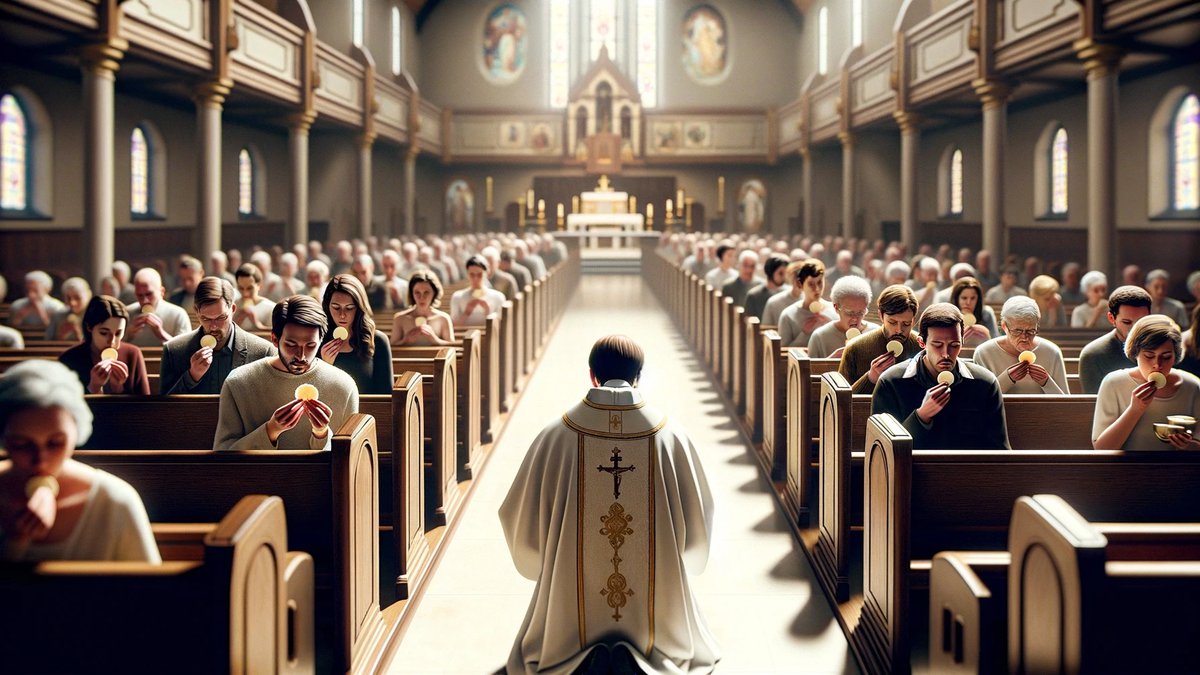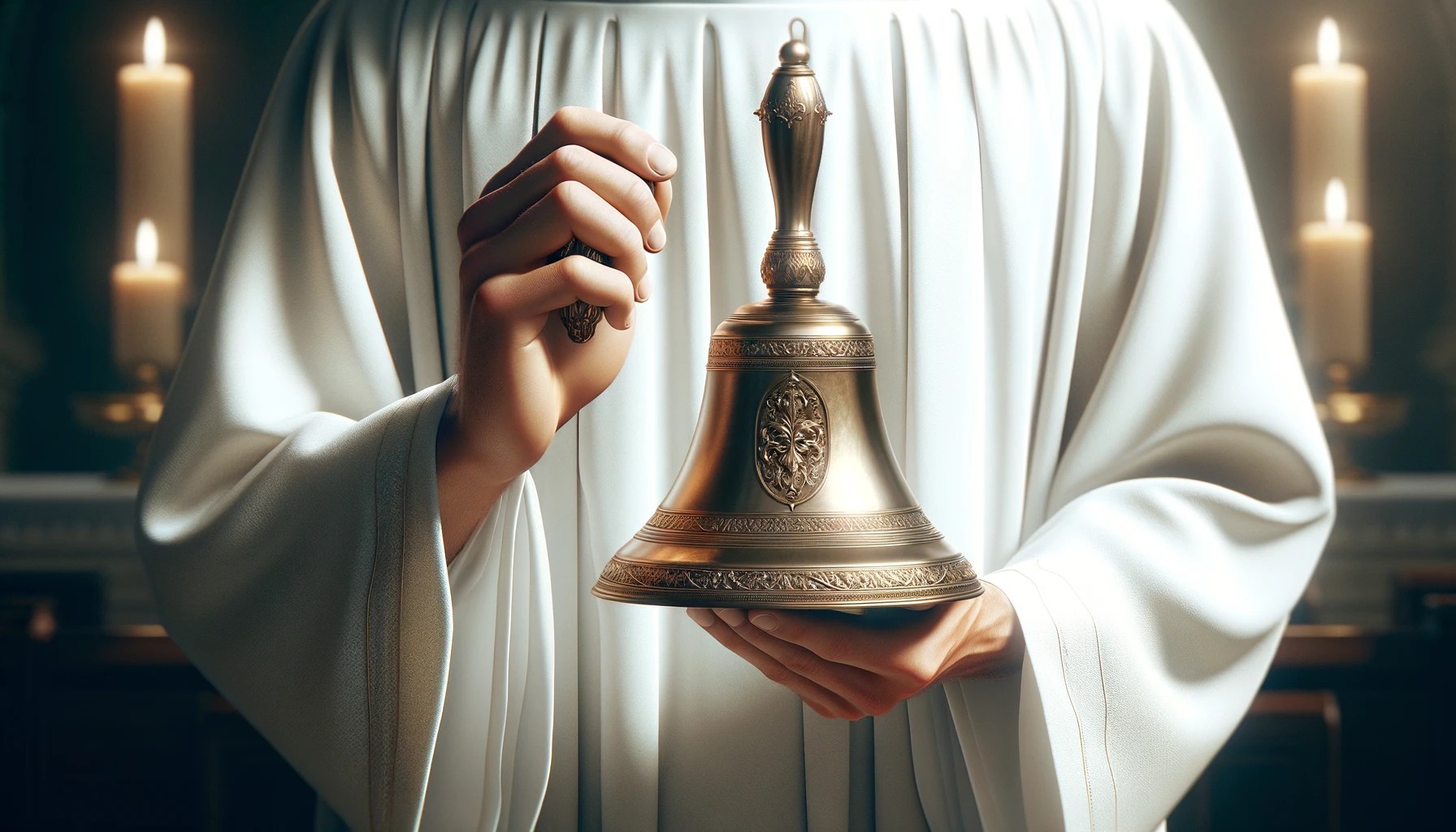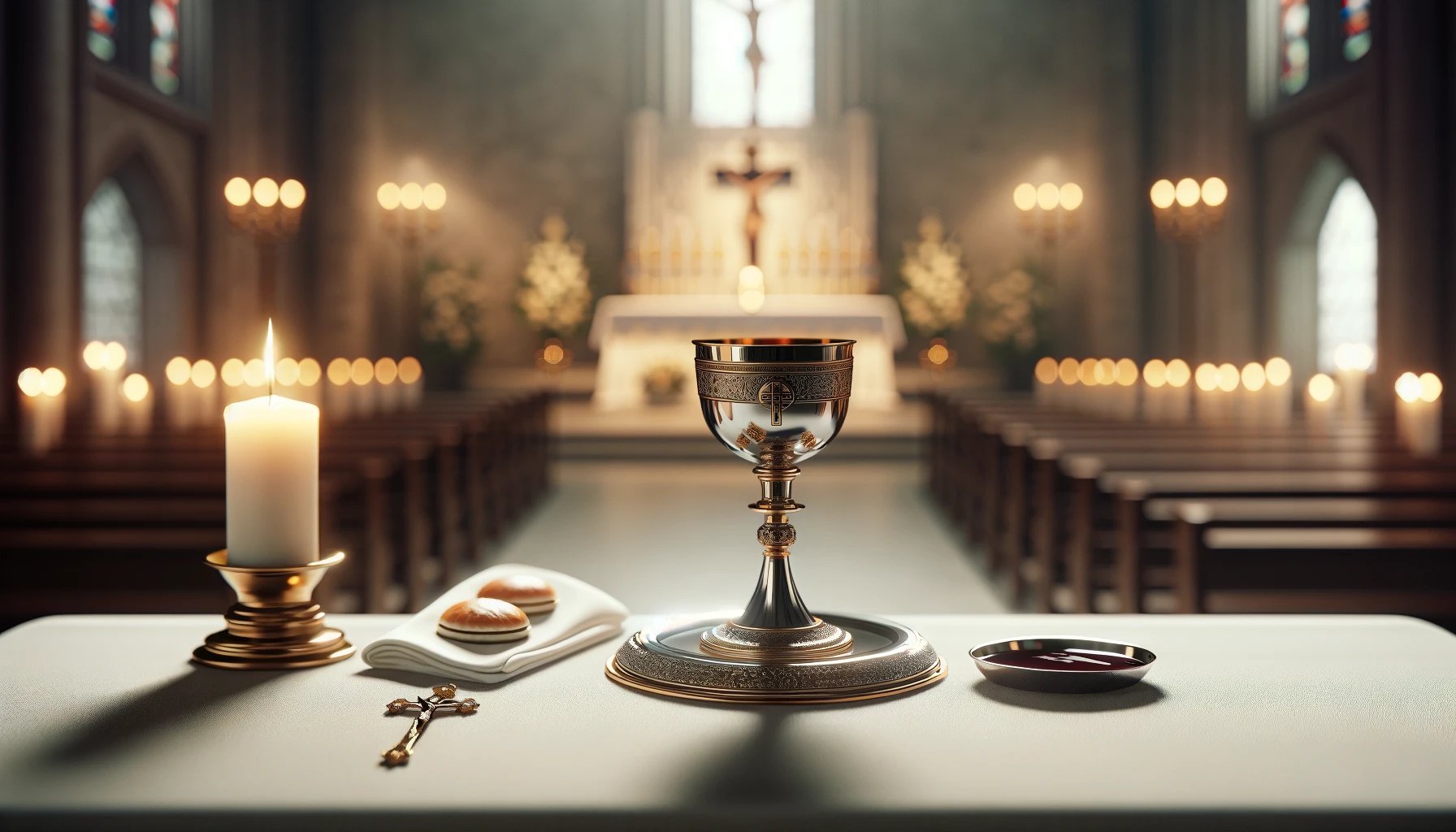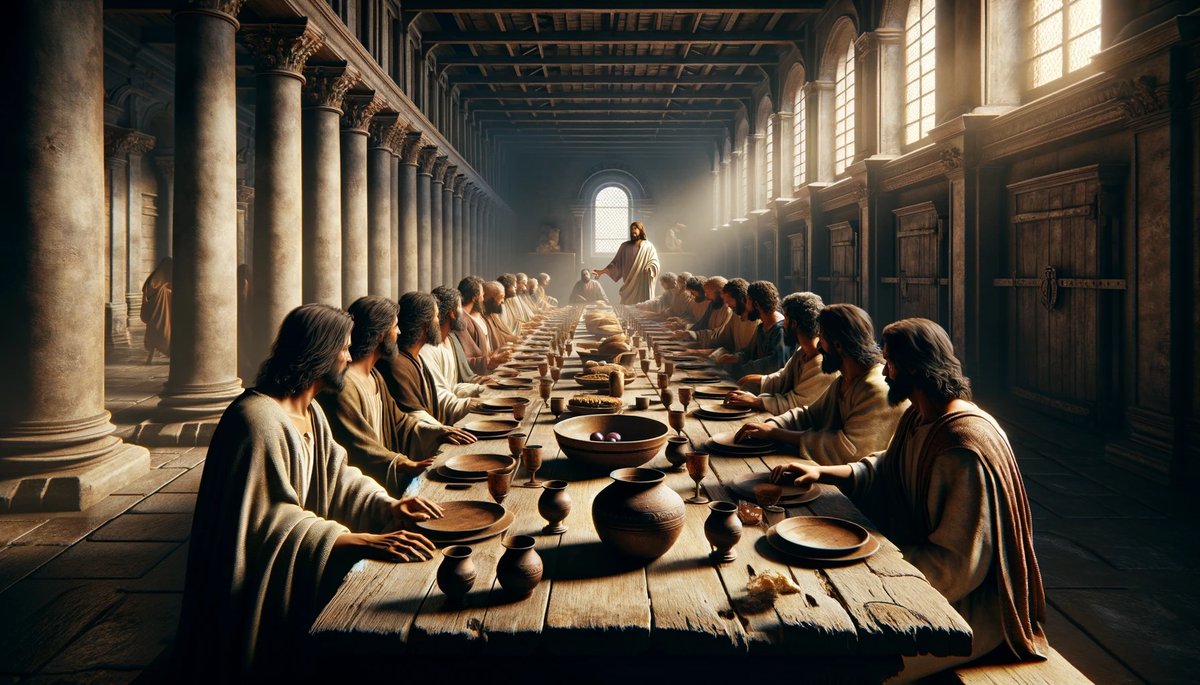Home>Theology and Spirituality>Why Don’t Catholics Drink Communion


Theology and Spirituality
Why Don’t Catholics Drink Communion
Published: February 24, 2024
Peter Smith, Editorial Director at Christian.net, combines deep insights into faith, politics, and culture to lead content creation that resonates widely. Awarded for his contributions to religious discourse, he previously headed a major organization for religious communicators, enhancing dialogue on faith's societal impacts.
Discover the theological reasons behind why Catholics do not drink communion. Explore the spiritual significance and traditions in theology and spirituality.
(Many of the links in this article redirect to a specific reviewed product. Your purchase of these products through affiliate links helps to generate commission for Christian.net, at no extra cost. Learn more)
Table of Contents
Introduction
Communion, also known as the Eucharist, holds profound significance in the Catholic Church. It is a sacred ritual that symbolizes the body and blood of Jesus Christ and is central to the faith and practice of Catholicism. The act of receiving communion is a deeply spiritual and communal experience for Catholics, representing the unity of believers with Christ and with one another.
In this article, we will delve into the history, theology, and practice of communion in the Catholic Church. We will explore the reasons behind the unique approach to communion in Catholicism, including the tradition of receiving only the consecrated bread and not the consecrated wine. Through this exploration, we aim to shed light on the rich tapestry of beliefs and practices that shape the Catholic faith and provide a deeper understanding of the significance of communion in the lives of Catholics around the world.
Read more: Why Do Catholics Take Communion
The History of Communion in the Catholic Church
The history of communion in the Catholic Church is deeply rooted in the origins of Christianity. The practice of communion finds its foundation in the Last Supper, a pivotal event in the life of Jesus Christ. According to the Gospels, during the Last Supper, Jesus shared bread and wine with his disciples, instructing them to partake of these elements in remembrance of him. This act of sharing bread and wine symbolized the body and blood of Christ, signifying a new covenant between God and humanity.
Early Christian communities continued the practice of sharing bread and wine as a commemoration of the Last Supper. The concept of communion as a sacred ritual of unity and remembrance became integral to the burgeoning Christian faith. As the early Church evolved, the celebration of communion took on greater significance, becoming a central act of worship and spiritual nourishment for believers.
Over time, the theology and practice of communion underwent developments within the Catholic Church. The doctrine of transubstantiation, which asserts that the bread and wine used in communion become the actual body and blood of Christ, became a defining belief within Catholic theology. This understanding of the Eucharist as the real presence of Christ transformed the way communion was revered and approached within the Catholic tradition.
The history of communion in the Catholic Church is also marked by periods of theological reflection and doctrinal clarification. The Council of Trent in the 16th century, for example, reaffirmed the Church's teachings on the Eucharist, solidifying the understanding of transubstantiation and emphasizing the importance of the priesthood in consecrating the elements of communion.
Throughout history, communion has been a unifying force within the Catholic Church, fostering a sense of spiritual connection and communal identity among believers. The rich historical tapestry of communion in the Catholic Church reflects the enduring significance of this sacred ritual and its profound impact on the faith and worship of Catholics worldwide.
The Theology of Communion in the Catholic Church
The theology of communion in the Catholic Church encompasses profound and multifaceted beliefs that underpin the significance of the Eucharist. At the heart of Catholic theology lies the doctrine of transubstantiation, a concept that holds immense theological weight in understanding the nature of communion.
Transubstantiation, a term derived from Latin roots meaning "change of substance," encapsulates the belief that during the consecration of the Eucharistic elements, the bread and wine undergo a profound transformation. According to Catholic theology, through the power of the Holy Spirit and the words of consecration spoken by a priest, the substance of the bread and wine is changed into the actual body and blood of Jesus Christ while retaining the appearance of bread and wine. This transformation is not merely symbolic or metaphorical; rather, it is understood as a miraculous and mystical reality that transcends human comprehension.
The theology of transubstantiation underscores the real presence of Christ in the Eucharist. Catholics believe that when they receive the consecrated bread, they are partaking of the true body of Christ, and when they receive the consecrated wine, they are partaking of the true blood of Christ. This profound understanding of communion as the actual presence of Christ's body and blood shapes the reverence and awe with which Catholics approach the Eucharist.
Furthermore, the theology of communion in the Catholic Church emphasizes the communal and sacrificial dimensions of the Eucharist. The act of receiving communion is not merely an individual expression of faith; rather, it is a communal participation in the sacrifice of Christ. Catholics believe that through the Eucharist, they are united with Christ and with one another, forming a mystical body that transcends earthly boundaries.
The theology of communion also highlights the nourishing and transformative power of the Eucharist. Catholics view the reception of communion as a source of spiritual sustenance, strengthening their relationship with God and nourishing their souls. The Eucharist is seen as a means of grace through which believers are empowered to live out their faith in the world.
In essence, the theology of communion in the Catholic Church is a rich tapestry of beliefs that affirm the profound mystery and significance of the Eucharist. It is a theology that speaks to the core of Catholic faith, emphasizing the real presence of Christ, the communal nature of the Church, and the transformative power of the Eucharist in the lives of believers.
The Practice of Communion in the Catholic Church
The practice of communion, known as the Eucharist in the Catholic Church, is a sacred and central ritual that holds profound significance in the lives of believers. The celebration of the Eucharist is deeply rooted in the liturgical tradition of the Catholic faith and is a focal point of worship and spiritual nourishment for the faithful.
In the Catholic Church, the practice of communion typically takes place within the context of the Mass, the central act of Catholic worship. During the liturgy of the Eucharist, the consecration of bread and wine occurs, symbolizing the transformation of these elements into the body and blood of Christ. The faithful then partake in the reception of the consecrated bread, known as the host, and in some cases, the consecrated wine, which is offered as the Blood of Christ.
The reception of communion in the Catholic Church is guided by a set of reverent and solemn rituals. Before receiving communion, Catholics participate in the Liturgy of the Word, where they engage in the reading of sacred scriptures and the proclamation of the Gospel. This is followed by the Liturgy of the Eucharist, during which the consecration of the bread and wine takes place. The faithful then approach the altar to receive communion, often kneeling or standing in a posture of reverence.
It is important to note that in the practice of communion in the Catholic Church, the consecrated bread is considered the fullness of Christ's presence, encompassing both his body and blood. As a result, the normative practice in the Latin Rite of the Catholic Church is for the faithful to receive communion under the form of the consecrated host alone, without partaking in the consecrated wine. This practice is rooted in the Church's theological understanding of the Eucharist and is upheld as a venerable tradition that reflects the unity of Christ's sacrifice.
The reception of communion is a deeply personal and communal experience for Catholics. It is a moment of profound spiritual encounter, as believers receive the body of Christ with reverence and devotion. The practice of communion in the Catholic Church serves as a tangible expression of the Church's unity and the believer's intimate union with Christ, fostering a sense of spiritual nourishment and communal solidarity.
In summary, the practice of communion in the Catholic Church is a sacred and reverent ritual that embodies the rich theological and liturgical traditions of the faith. It is a profound expression of the real presence of Christ in the Eucharist and serves as a source of spiritual nourishment and communal unity for Catholics around the world.
The Reasons Why Catholics Don't Drink Communion
The practice of communion in the Catholic Church, particularly the norm of receiving only the consecrated bread and not the consecrated wine, is rooted in theological, historical, and practical reasons that reflect the rich tapestry of Catholic tradition and belief.
Read more: Why Can Lutherans Take Catholic Communion
Theological Considerations
The theological rationale behind the exclusive reception of the consecrated bread in the form of the host lies in the Church's understanding of the Eucharist. According to Catholic doctrine, the fullness of Christ's body, blood, soul, and divinity is present in the consecrated host. Therefore, partaking in the consecrated bread alone is considered to provide the complete spiritual nourishment and unity with Christ that the Eucharist signifies. This theological perspective underscores the profound belief in the real presence of Christ in the Eucharist and the efficacy of receiving the consecrated host as a means of encountering Christ in his entirety.
Historical Precedents
The historical development of communion practices within the Catholic Church has also contributed to the norm of receiving only the consecrated bread. Throughout the centuries, various factors, including liturgical customs, theological emphases, and pastoral considerations, have shaped the Church's approach to communion. The tradition of offering the consecrated bread alone can be traced back to early Christian liturgical practices and has been upheld as a venerable custom that reflects the unity of Christ's sacrifice and the Church's theological understanding of the Eucharist. This historical continuity underscores the enduring significance of the normative practice of receiving only the consecrated host in the Catholic tradition.
Practical Considerations
Practical considerations also play a role in the Catholic Church's practice of not offering the consecrated wine to the faithful during communion. Factors such as the logistics of administering the consecrated wine to a large congregation, concerns regarding spillage or mishandling of the precious blood of Christ, and the need to ensure reverent and orderly distribution of communion have influenced the practical implementation of communion practices. By focusing on the reception of the consecrated host, the Church is able to maintain a sense of solemnity and reverence in the administration of communion while addressing logistical and pastoral considerations.
In essence, the reasons why Catholics don't drink communion are multifaceted, encompassing theological, historical, and practical dimensions that reflect the depth of Catholic tradition and the Church's reverence for the Eucharist as the source and summit of the Christian faith. The normative practice of receiving only the consecrated bread underscores the profound theological, historical, and practical considerations that shape the Catholic Church's approach to communion, emphasizing the real presence of Christ and the unity of believers in the Eucharistic celebration.
Conclusion
In conclusion, the practice of communion in the Catholic Church is a sacred and multifaceted ritual that embodies centuries of theological reflection, historical continuity, and spiritual significance. The rich tapestry of beliefs and practices surrounding communion reflects the profound reverence and awe with which Catholics approach the Eucharist, recognizing it as the real presence of Christ and a source of spiritual nourishment and communal unity.
Throughout history, communion has served as a unifying force within the Catholic Church, fostering a sense of spiritual connection and communal identity among believers. The theological understanding of transubstantiation, the communal and sacrificial dimensions of the Eucharist, and the nourishing and transformative power of communion underscore the profound significance of this sacred ritual in the lives of Catholics.
The normative practice of receiving only the consecrated bread, rather than the consecrated wine, is rooted in theological, historical, and practical considerations that reflect the depth of Catholic tradition and the Church's reverence for the Eucharist. The theological rationale, historical precedents, and practical considerations surrounding communion practices highlight the intricate tapestry of beliefs and customs that shape the Catholic approach to the reception of the Eucharist.
Ultimately, communion stands as a testament to the enduring presence of Christ in the life of the Church and the spiritual nourishment it provides to believers. It is a tangible expression of the unity of Christ's sacrifice and the believer's intimate union with Christ, fostering a sense of spiritual nourishment and communal solidarity.
As Catholics partake in the reception of the consecrated bread, they are reminded of their unity with Christ and with one another, forming a mystical body that transcends earthly boundaries. The practice of communion serves as a profound expression of the real presence of Christ in the Eucharist and a source of spiritual nourishment and communal unity for Catholics around the world.
In essence, the practice of communion in the Catholic Church is a sacred and reverent ritual that embodies the rich theological and liturgical traditions of the faith. It is a profound expression of the real presence of Christ in the Eucharist and serves as a source of spiritual nourishment and communal unity for Catholics around the world.














